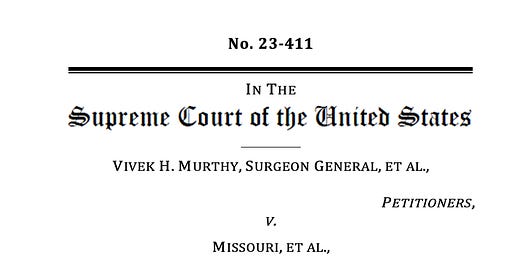The battle for the sanctity of free speech has intensified. The case of Murthy v. Missouri (aka Missouri v. Biden), where I, alongside the Liberty Justice Center, have taken steps to challenge governmental overreach, underscores the urgency of this battle. My lawsuit is currently in a bit of a holding pattern until the Supreme Court comes out and SMACKS down the government. That’s my expectation anyway!
This struggle is about safeguarding the fundamental rights that underpin our society. As we engage with this amicus brief lodged with the U.S. Supreme Court, it’s imperative to discern the gravitas of the allegations and the precedent it seeks to challenge. Lets’s extracts some pivotal excerpts to elucidate the crux of our argument.
Against the Curtains of Censorship
At the heart of Murthy v. Missouri is the contention that the federal government has overstepped its bounds by effectively censoring social media content under the guise of combating "misinformation":
"No one disputes that the government has been communicating with social media companies in the pursuit of censorship... The question is whether these communications amounted to state action under the First Amendment."
In the shadows of a global pandemic, what was purportedly an effort to safeguard public health morphed into a broader campaign to police digital discourse, infringing upon the First Amendment. This intricate dance between governmental entities and social media platforms raises profound questions about the essence of free speech in our digital age.
Training as a Tool for Censorship
One of the more disquieting revelations within the lawsuit and brief pertains to the training provided by government officials to social media companies, designed to fine-tune the silencing of dissenting voices:
"Because of this training, and the benefit to the government derived from it, the government’s argument that the social media companies are 'merely responding to information, persuasion, or criticism from government officials [and] not state actors' must fail."
Such collaborations between the state and private entities to enforce censorship usher us into a new era of state-involved censorship, where the lines between government and platform become perilously blurred.
The Threshold of State Action
Delving deeper, the brief makes a compelling case that the concerted actions of the Biden Administration and social media companies constitute state action, thereby violating the First Amendment. A historical assessment of private parties engaging in state action sets the legal backdrop:
"This Court has held that private parties engage in state action when they work with government officials to deprive individuals of their constitutional rights."
In essence, when the machinery of the state intertwines with digital platforms to censor speech, a clear transgression of constitutional boundaries occurs.
The Defense of Free Expression
As the amicus brief meticulously outlines the training, collaborations, and subsequent actions taken by the government and social media companies, the underlying question emerges: At what cost does this censorship come? The defense of free expression is not simply a legal battle but a testament to our unwavering commitment to the principles of liberty and democracy.
"...the government benefits from having voices that have opposed its COVID-19 measures and opinions silenced."
As we traverse through these troubling waters, it’s incumbent upon us all to remain vigilant defenders of the freedoms that define us. The case of Murthy v. Missouri serves not just as a legal contest but as a clarion call to uphold the very essence of our democratic ideals in the face of encroaching silence. In the end, it's about much more than just one case or one policy—it's about ensuring the enduring vibrancy of free speech for generations to come.





Thank you
Anxiously waiting for the smackdown on the Biden regime. Thanks for your efforts Justin!